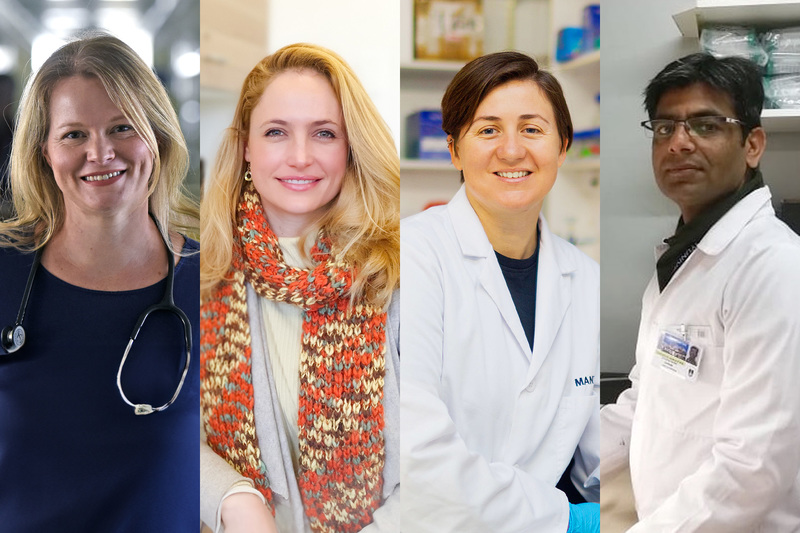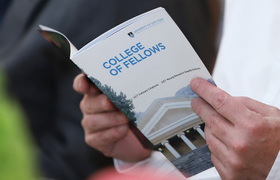Second career-boosting opportunity for translational scientists
17 October 2023 | Story John Woodland. Photo UCT News. Read time 3 min.
An imbalance exists between well-resourced laboratories in the Global North and the relative scarcity of research skills and infrastructure in Africa. This is in spite of the fact that the continent faces a disproportionately high burden of disease which is set to worsen as the effects of climate change become apparent. Consequently, the Crick Africa Network (CAN) was established in 2017 as an equitable partnership with institutions across the continent to enable African scientists working in Africa to contribute directly to tackling these challenges.
Since then, 18 CAN Fellows have progressed through the programme, building their careers as independent scientists and furthering their research projects in the infectious diseases arena.
Now, thanks to a £7.5 million investment from LifeArc, the self-funded charitable medical research organisation, a new round of CAN Fellows will be established to receive support for five years, with a shift towards translational research. “CAN2” will offer African Career Acceleration (ACA) Fellowships for postdoctoral biomedical researchers who demonstrate the potential to become translational research leaders in Africa.
“The CAN Fellowship has been invaluable to my career as a South African clinician researcher.
CAN2 Fellows will receive four years of funding and must be hosted at one of five African partner institutions, of which the University of Cape Town (UCT) is one. Importantly, the focus will be on translational research that bridges the gap between academic research and clinical development. CAN2 Fellows will be offered mentorship and support in grant writing, research ethics and commercialisation, in addition to opportunities to utilise the world-class laboratory facilities and platforms at the Francis Crick Institute in London and LifeArc’s state-of-the-art facilities in Stevenage and Edinburgh.
Invaluable
“The CAN Fellowship has been invaluable to my career as a South African clinician researcher. I would not have been able to return to South Africa as a researcher without the fellowship as there is very little postdoctoral research funding for clinicians locally,” said Dr Kate Webb, a senior lecturer in the Department of Paediatrics and Child Health at UCT’s Faculty of Health Sciences (FHS). “I have used the fellowship to collect extremely rare and valuable samples and data in a neglected field, leveraged it to get local funding, published high-impact papers, and set up a laboratory research group while establishing myself as a local clinical and research leader.”
Dr Webb is one of four UCT‐based CAN1 recipients, all of whom speak highly of the value of the CAN Fellowships in impacting their research trajectory. “The CAN Fellowship has undoubtedly been a tremendous and deeply appreciated stepping stone for me to advance my career,” said Dr Ursula Rohlwink, an associate professor in the Division of Paediatric Neurosurgery, whose work focuses on understanding the mechanisms underlying brain injury due to trauma or tuberculosis (TB) infection. “During the time of my CAN Fellowship, I was able to apply for and secure a Wellcome International Intermediate Fellowship, which will support me and my research for five years. This fellowship builds on the work of my CAN project and involves collaborative work with the Crick [the Francis Crick Institute], and I am delighted to maintain my visiting scientist status there for the next five years.”
“CAN represents an opportunity for African scientists to connect with one another across countries and institutions to form collaborations.”
Also investigating the biology of Mycobacterium tuberculosis, the causative agent of TB, is Dr Mandy Mason of UCT’s Institute of Infectious Disease and Molecular Medicine (IDM). By investigating a wide range of bacteria with mutations, Dr Mason hopes to find some that are more susceptible to both new and existing drugs – which may open up new ways to prevent and treat TB. “CAN represents an opportunity for African scientists to connect with one another across countries and institutions to form collaborations that are founded in our aligned aspirations for scientific endeavours to have a positive impact on our countries and peoples, an understanding of the challenges intrinsic to our African cohort of researchers, and equilateral friendships that are developed though through the facilitation of the network.”
Lastly, Dr Suraj Parihar, based in CIDRI-Africa (the Wellcome Centre for Infectious Disease Research in Africa), is interested in the function of a special gene called IFITM1 that is important in the host immune response to TB and other infectious diseases such as listeriosis. “The CAN Fellowship enabled me to establish a research programme and assemble a team of talented researchers. This fellowship is unique in providing an opportunity to work at the Francis Crick Institute and additional resources to enhance soft skills,” he said.
“During my CAN Fellowship, I established independent collaborations and networks within Africa and the United Kingdom through the annual meetings and my visit to the Crick. This fellowship also allowed me to drive independent research distinct from my mentors and receive independent research grants while maintaining long-term collaborations.”
Applications for the second round of CAN ACA Fellowships are open until 19 November 2023 and eligible scientists are encouraged to apply.
 This work is licensed under a Creative Commons Attribution-NoDerivatives 4.0 International License.
This work is licensed under a Creative Commons Attribution-NoDerivatives 4.0 International License.
Please view the republishing articles page for more information.










